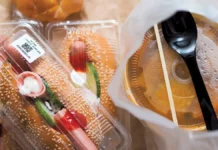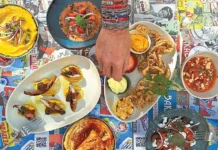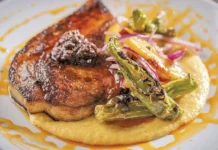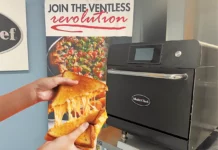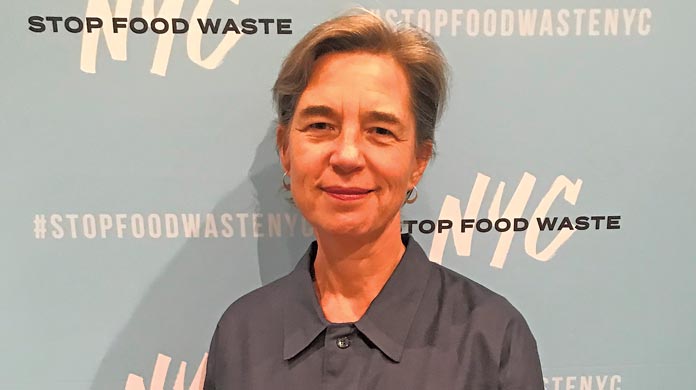
Interview by Annette Nielsen
Prior to being founder and CEO of Matriark Foods, Anna Hammond spent almost three decades as a nonprofit leader implementing sustainable community programs. Most recently, Hammond was executive director for The Sylvia Center, a trail blazing food-education program that, under her leadership, collaborated with farmers, institutions, funders, and foundations committed to solving food insecurity through education and reimagined food systems. Anna successfully expanded healthy eating and cooking programs in public housing community centers in all five NYC boroughs and all six Columbia County school districts.
In this role, Anna Hammond saw the dearth of access to healthy food and the massive amount of farm produce going to waste. Hammond founded Matriark Foods in 2018 to solve both of these critical issues. Matriark Foods is producing a line of nutritious and delicious multi-use soup and sauce bases made from vegetable remnants and farm surplus with foodservice as the target market.
Describe the term upcycling and what it means for your food business and sustainability. How do you identify your partners, farmers, and producers?
The official definition, as described by the Upcycled Food Association [where Anna Hammond is a founding member] is: ‘Upcycled foods use ingredients that otherwise would not have gone to human consumption, are procured and produced using verifiable supply chains, and have a positive impact on the environment.’
The Upcycled Food Association is a quickly expanding group, and we’re working towards certification criteria. We found out through a recent Mattson study about 60 percent of buyers are interested in food that has a positive impact on the environment. Upcycled is one of those categories.
Upcycling also relates to how our grandmothers used to cook. One of the founding principles of Matriark is doing what our grandmothers did with food – not waste it – they never threw anything out! Matriark is just doing this at scale.
We work with suppliers in three different areas: we purchase remnants from large fresh-cut facilities; we buy surplus produce directly from small to mid-scale farmers; and we source from aggregators focused on surplus and imperfect vegetables.
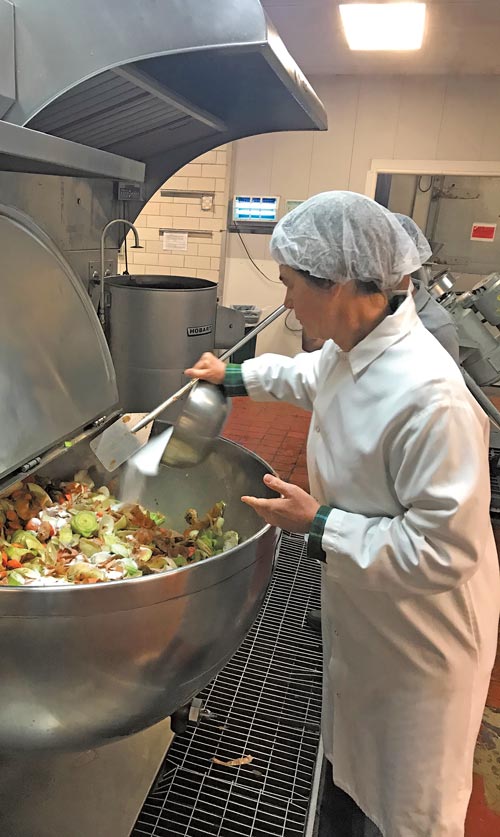
The quantities of supply being sent to landfill are staggering. Fresh-cut facilities produce more than 200,000 pounds of remnants per week that mostly go to landfill – and sometimes for animal feed or compost creating massive amounts of greenhouse gasses. Matriark has created new revenue streams for these businesses to sell remnants and surplus as they would sell any regular vegetable. We’re getting the last mile out of vegetables already grown and harvested – and the natural resources used to produce them don’t go to waste.
Working with fresh-cut remnants and surplus still requires the same health safety requirements as the regular supply chain. The process of procurement still needs traceability and the proper paperwork in place to protect consumers. Imagine in New York City where you have over a million children every day eating most of their nutrition in school, or think about how many seniors are in senior facilities, or the number of individuals in hospitals – it’s a massive market that has been dominated by 19 companies in this country. We’re interrupting this by solving issues of environmental and health impacts, and of overly processed food simultaneously.
How has Covid-19 changed your approach, modified your marketing strategy or increased/decreased production and sales?
As a new company, we were just launching in a big way this spring with Baldor Specialty Foods, US Foods, and Hudson Valley Harvest, where 75 percent of those distributors’ accounts were institutions and restaurants. Much of that market suddenly stopped. Where some distributors shifted from food service to direct-to-consumer, we weren’t yet set up for retail. We were launching into a food service market that essentially didn’t exist.
Our original plan was to release a retail product in 2021. So, we fast-forwarded the vegetable broth concentrate into a 200mL carton to test the retail market. That’s one pivot, but it doesn’t make us veer from our principle mission of feeding as many people as possible healthy affordable foods. We’ve been selling to organizations making meals for the hungry, and we’re starting to open up hospital and other foodservice accounts simultaneously. In the midst of all of this, we sold out of product. We’re thrilled to have come onto the market with something delicious, inexpensive and great for the environment.
Has the pandemic increased the need for your healthful product in the institutional setting (like hospitals)?
We’re in the process of becoming an approved item for public hospitals, and we’ve started to reach out to the private hospitals. That’s a slow process, and we’re waiting to reapproach some customers until life has settled down. That said, our vegetable broth is such a clean and healthful product, and a perfect fit for mass-produced healthy meals.
What are your goals for expansion over the next five years?
We aspire to be a national brand, to divert millions of pounds of vegetables from landfill, and to be a company that participates in feeding as many people as possible the healthy food they deserve.
What has surprised you the most on this food business journey and what has been your biggest challenge?
I’ve been really surprised and moved by how incredibly willing traditional food production people have been to talk with us and re-think food scraps into a product. There is so much infrastructure that exists in this country, and EVERYONE wants their children and their elders to have healthier lives. We haven’t met a single person who’s said that what we’re doing is crazy. On the contrary – we’ve found people willing to go the extra mile to help us make this happen.
The most difficult part is distribution. Because we wanted to focus on foodservice and getting quality food to as many as possible while mitigating waste, the best path was through institutions. Most institutions are required to purchase through distributors, and in order to get a distributor, you need to have a substantial number of customers.
The upside is that foodservice is increasingly interested in not only healthful food, but food that’s healthy for the environment. The needle is moving on farm-to-table from the restaurant world and penetrating a broader market. As it should. Everyone deserves to eat this way.
We tick off a lot of boxes, too – we’re attractive as a company because we produce healthy food, we divert food from a landfill, and we’re a woman-founded business.
We’ve captured the attention of co-packers to fresh-cut facility and distributors, to foodservice operators who want something easy, clean, and delicious, and all of these people have worked with us to break into a part of the food system, that until recently, was owned solely by large companies.
Who (or what) has been your inspiration?
It is my grandmothers – they are at the core of why I engaged in this project. They never wasted anything and there was always room for one more guest at the table.
What is your hashtag?
#itjustmakessense
Award-winning writer, editor, and culinary nutrition educator, Annette Nielsen has been engaged in food policy and agricultural initiatives for nearly two decades. An Adirondack native, she now lives in Harlem. Follow her online @The_Kitchen_Cab.


















